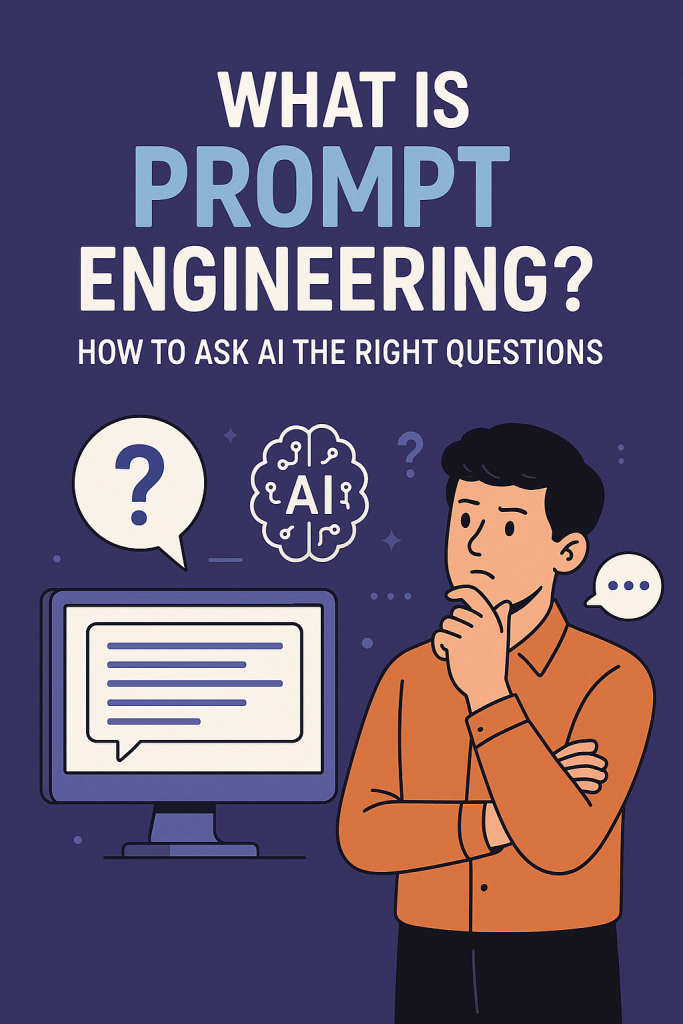Have you ever asked a question to a voice assistant or typed something into a tool like ChatGPT—and the answer wasn’t quite what you expected? You’re not alone. Knowing how to ask the right kind of question, or “prompt,” is the secret to getting better answers from artificial intelligence (AI). This article explains what “prompt engineering” means in simple terms—and how you can use it to make the most out of your conversations with tools like ChatGPT.
Don’t worry—you don’t need to be a computer expert. This guide is made especially for beginners and older adults. Let’s walk through it together.
Table of Contents
Key Takeaways
- Prompt engineering means learning how to ask questions that AI tools can understand clearly.
- You don’t need technical knowledge—just a few easy tips and examples.
- Clear, specific prompts give you better, more helpful answers.
- Practice helps: the more you try, the better your results.
- AI tools are here to help—you’re in control of the conversation.
What Is Prompt Engineering?
Let’s start with the basics. “Prompt engineering” is just a fancy way of saying: how to talk to an AI in a way it understands best.
Think of it like ordering at a restaurant. If you simply say, “I want food,” the waiter won’t know what kind. But if you say, “I’d like a grilled chicken sandwich with no mayo,” now you’re being specific—and you’re more likely to get what you want.
The same idea applies to AI tools like ChatGPT. If you give a vague question, the answer might be vague too. But if you’re clear and specific, the AI can give you a much better response.

Why Good Prompts Matter
You might be thinking: “Can’t I just type whatever I want?” Of course! But if your question isn’t clear, AI might:
- Give you an answer that’s too general
- Focus on the wrong topic
- Leave out something you needed
A well-written prompt can help you:
- Save time
- Get more accurate answers
- Avoid confusion or back-and-forth
And most importantly, it helps you feel more confident using technology.
Simple Tips to Improve Your Prompts
You don’t need perfect grammar or tech lingo. Just follow these beginner-friendly tips:
1. Be Specific
Instead of:
“What’s a good recipe?”
Try:
“What’s an easy chicken soup recipe with ingredients I might already have at home?”
2. Set the Tone or Style
Let the AI know how you want it to answer.
Example:
“Explain what inflation is in simple terms, like you’re talking to someone with no background in finance.”
3. Give Context
Adding a little background helps.
Example:
“I’m a beginner using my iPhone for the first time. Can you explain how to send a text message?”
4. Ask for Lists or Steps
Sometimes you want step-by-step help.
Example:
“Can you give me 5 simple ways to stay safe from online scams?”
5. Ask for Rewrites or Edits
Want help polishing your words?
Example:
“Can you make this email sound more polite?”
Or:
“Rewrite this sentence to sound more friendly.”
6. Try Again with Clarifications
If the first answer isn’t quite right, you can always respond with something like:
- “Can you explain that more simply?”
- “Give me a shorter version.”
- “Can you focus on just the pros and cons?”
Real-Life Example
Let’s say you want to plan a family dinner. Here’s how a good prompt might look:
Not-so-great prompt:
“What should I cook?”
Better prompt:
“I’m planning a dinner for 4 adults and 2 kids. One person is vegetarian. Can you suggest an easy meal that everyone might enjoy?”
The better version gives the AI more information—so it can give you a more helpful answer.
Common Mistakes to Avoid
Even experienced users sometimes forget these:
- Being too vague
- Asking multiple things at once
- Not following up if the answer is unclear
Quick Fixes:
- Break long prompts into smaller ones
- Ask one question at a time
- Be patient—it’s okay to try a few times
Final Thoughts
You don’t need to be a tech expert to use AI well. Just like learning how to ask better questions in real life, writing better prompts comes with a little practice and a lot of curiosity.
Think of prompt engineering as a helpful trick—not a skill you need to master overnight. With just a few simple tips, you can get smarter answers, save time, and feel more in control when using AI tools like ChatGPT.
So go ahead—try asking something new today!
